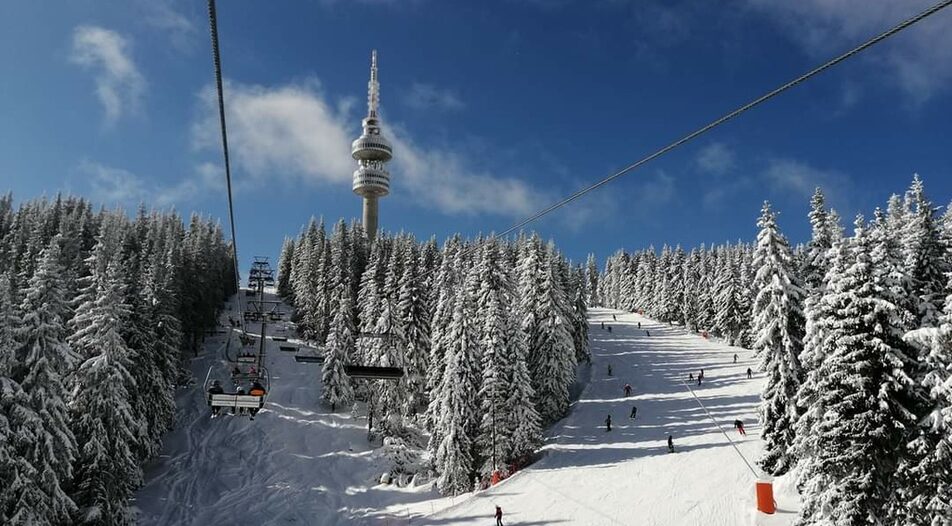On December 17, Bulgarian mountain resorts were in the embarrassing situation of having to officially open the winter season without snow and with almost no ski runs working. Due to unusually warm winter weather, many Bulgarian resorts were faced with the challenge of trying to provide some decent conditions for tourists.
The initial expectations were for a much stronger season than last year but the slow coming of winter resulted in the cancellation of many bookings in the first month. On top of that, winter resorts have to cope with high inflation and rising energy costs, which the increase in ski pass and hotel prices cannot compensate, people in the industry say. Extending the tourist season can help but that remains a difficult task.
Warm welcome
The three major winter resorts - Borovets, Pamporovo and Bansko - hoped for a better season than in the pre-pandemic year 2019, as almost all bookings were sold out a year ago. But warm December caused many cancellations. Interim tourism minister Ilin Dimitrov said cancellations were 5 percentage points above the usual rates.
According to Svetlana Atanasova, manager of the Samokov hotel in Borovets, a month has been lost, although there are already favorable conditions for skiing. "Our revenues are 70% smaller than a year ago," according to Borosport, the concessionaire of the Borovets ski runs and owner of the skiing facilities. The company says the delayed start can be compensated with a flexible pricing policy and extension of the winter season until the end of April. "Unfortunately, at that time of the year people start thinking about the seaside, although March and April are the best time for winter sports in the mountain," Borosport said.
Fixed charter programs can also be an issue. "Tour operators with fixed programs, which usually end in the middle or the second half of March, will not adapt to a longer season. The others may do," says Marian Belyakov, CEO of Pamporovo, the company that operates the ski runs in the resorts of Pamporovo and Chepelare. The company relies on last-minute reservations too.
An expensive season
Warm winter is coupled with surging expenses. In Belyakov's words, different types of costs have risen by between 30% and 150%, including food deliveries. "Labor costs in our business have increased by 30%, those for maintenance and technical operation, by between 30% and 40%," Borosport said.
The hardest blow comes from energy prices, which have doubled, taking into account the state subsidy for electricity prices. Without the subsidy, the surge would have been by more than 500%, mainly due to the spike in the natural gas price, says Borosport. "We are simply not competitive," Svetlana Atanasova explained.
The price increase for customers is about 20%, including accommodation. The prices of ski passes for adults were raised from 75 levs to 85 levs a day. Both Pamporovo and Borovets comment that they have opted for a more balanced price hike approach, as the market could not bear a bigger jump but that will affect their profit margins.
Snowmaking
The battle now is to extend the tourist season and there are several ways for that. Firstly, snowmaking. The availability of equipment however is not a sufficient condition, as snow guns require a minimum temperature of about minus 1.7 degrees Celsius to operate.
According to Belyakov this was just a spell of warm winter weather and there is not a lasting trend to warming. Last winter, for instance, there was a lot of snow, which also hampered resorts' operation, he says.
Another possible solution is for resorts to offer a year-round mountain service, congress tourism, etc. "The mountain is and will always be attractive, even if winters are warmer. There is nothing like clean air and beautiful scenery," Borosport says. "Borovets is becoming increasingly popular for visitors throughout the year, especially in summer. Many resorts in Europe and the United States attract more tourists in summer, because the mountain then is accessible to more people."
To the delight of ski lovers and hotel managers alike, snow covered the mountain slopes in late January, providing good conditions for winter sports.
On December 17, Bulgarian mountain resorts were in the embarrassing situation of having to officially open the winter season without snow and with almost no ski runs working. Due to unusually warm winter weather, many Bulgarian resorts were faced with the challenge of trying to provide some decent conditions for tourists.
The initial expectations were for a much stronger season than last year but the slow coming of winter resulted in the cancellation of many bookings in the first month. On top of that, winter resorts have to cope with high inflation and rising energy costs, which the increase in ski pass and hotel prices cannot compensate, people in the industry say. Extending the tourist season can help but that remains a difficult task.












